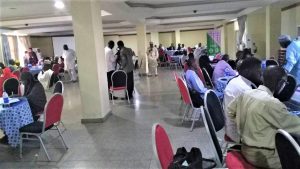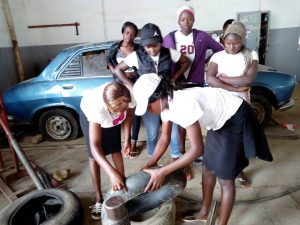
A study commissioned by the dRPC on the Craft curriculum in Nigeria found out that the Craft Curricula is purely technical and lacks entrepreneurial education except Leather Goods curriculum that contain some aspects of entrepreneurship curriculum.
Sequel to series of bilateral and multilateral engagements with NERDC, dRPC agreed to work in collaboration NERDC and UNIDO to review the 34 trade subjects and infuse entrepreneurship education into the 34 trade subjects’ curricula. The 34 trade subjects are:
Auto Body repair and spray painting, Dyeing and bleaching, Auto Electrical work, Printing craft practice, Auto Mechanical work, Cosmetology, Auto Parts merchandising, Leather goods manufacturing and repair, Air Conditioning Refrigerator, Welding and fabrication engineering craft practice, Short hand, Electrical Installation and Maintenance Work, Data processing, Radio, TV & electrical work, Store keeping, Block laying, Brick Laying & Concrete Work, Book keeping, Painting and Decoration, GSM maintenance, Plumbing and pipe fitting, Photography, Machine woodworking, Tourism, Carpentry and Joinery, Mining, Furniture making, Animal Husbandry, Upholstery, Fisheries, Catering and craft practice, Marketing, Garment making, Salesmanship, and Textile trade.
According to the NERDC guidelines for curricula review, the curricula review must go through 3 stages; Review and Infusion Workshop, Critique Workshop, Editorial Workshop. The final deliverable must either be submitted in form of a memo at the JCCE or tabled at the NCE Meeting for Ministerial assent.
The curricula Review kick-started on the 30th June 2017 with the speech made by the Executive Secretary, NERDC wherein he stated that the review is aimed at improving the effectiveness of the trade subjects in terms of content and implementation. He acknowledged the support of the UNIDO and dRPC in making the curriculum review a reality. He acknowledged that the purpose of the review and incorporation / infusion of entrepreneurial content in the curricula came by as a result of feedback, empirical and anecdotal evidences regarding the functionality, relevance and teachability of the content of the 34 Trade subjects curricula. There was also apparent lack of proper understanding of the concept, philosophy and underlying principles of Entrepreneurship education. There was also the inability of some teachers and school proprietors to adequately comprehend the strategies behind content Organisations and specification.

dRPC sponsored experts, carefully selected from various institutions across Nigeria, consisting of content specialists, teacher educators, secondary school teachers, practitioners and University dons to support the review process.
In sum, dRPC sponsored:
- 34 experts for the review and infusion workshop which was held between the 30th June to 4th July 2017;
- 16 experts for the Critique workshop which was held between 5th July to 9th July 2017; and
- 14 for the editorial workshop which was held between 20th and 21st July 2017.
The revised trade subjects curricula was finally approved at the Ministerial session of 62nd National Council on Education on the 28th July 2017 held in Kano.
After the approval of the 34 Trade subjects curricula, dRPC worked in collaboration with NERDC and UNIDO to review the Teachers’ guide for the 34 revised trade subjects.
dRPC sponsored experts, carefully selected from various institutions across Nigeria, consisting of content specialists, teacher educators, secondary school teachers, practitioners and University dons to support the teachers’ guide review.
In sum, dRPC sponsored:
- 15 experts for the review of teachers’ guide which was held between the 14th – 18th August 2017
- 20 experts for the Critique workshop which was held between 11th and 12st September 2017; and
- 10 for the editorial workshop which was held between 14th – 15th September 2017.
At the end of the workshops, the experts supported by the dRPC came together and formed a network of trainers with sole aim of supporting girls child in their respective localities with different entrepreneurship skills that will help them to cater for themselves after finishing schools.


